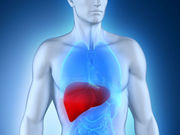Rates of Acid Suppression Med Rx Still Too High in NICUs
Meds in hospitalized high-risk infants linked to necrotizing enterocolitis, increased risk of death
New Research Questions Link Between Statin Use and CRC Risk
It may be cholesterol levels that are associated with reduced chance of colorectal cancer
Doctors Have a Only a Few Weeks Left to Review Financial Data
Physicians have a few weeks left to review, dispute reports relating to their financial ties to industry
U.S. Health Report Card Finds Racial, Ethnic Disparities Persist
But infant mortality rates, numbers of uninsured are improving, government analysis reveals
Detecting, Isolating C. difficile Carriers Beneficial
Strategy linked to decrease in the incidence of health care-associated C. difficile infection
First-Degree Relative Grafts Don’t Up Liver Disease Recurrence
No difference in autoimmune recurrence, liver graft, or patient survival using first-degree donors
A Doctor’s View: EHRs Impair Physician-Patient Relationship
Physician discusses impact of EHR on the physician-patient relationship
Physicians Can Get Involved in Developing Payment Models
New payment models relating to bone metastases, breast cancer developed by ASTRO
Improved Survival for Certain Cancers With Low-Dose Aspirin
Improved odds seen for patients with colon, prostate, or breast tumors, but research isn't definitive
Stomach CA Risk Up With Alcohol, Processed Meat Consumption
Excess weight also seems to increase chances of disease, and risk increases as three factors increase



















